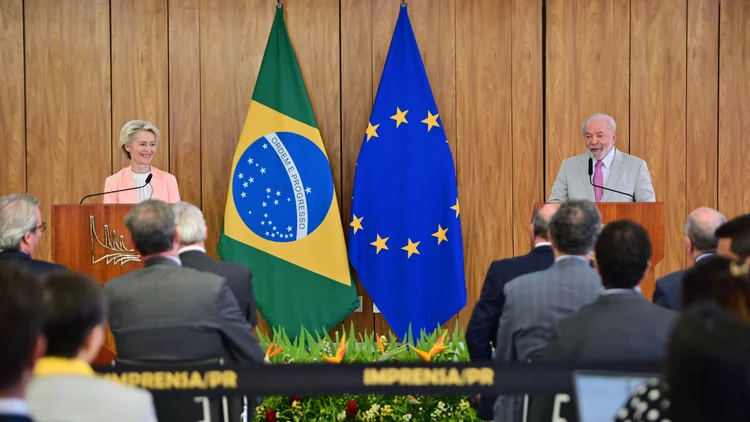EU - Mercosur
More geopolitics and less protectionism

EU-Kommissionspräsidentin Ursula von der Leyen und Brasiliens Präsident Luiz Inácio Lula da Silva. © picture alliance / ZUMAPRESS.com | Frederico Brasil
It is impossible to understand that since 1995 work has been going on on the free trade agreement between the Mercosur countries and the European Union. Since 2004 negotiations intensified, and since 2019 there has been a more or less complete draft agreement. Back then, negotiations from Europe failed due to resistance from Austria, then came the Covid19 crisis, and now France is opposed, due to resistance from the country's farmers.
The conclusion of the agreement has been postponed until after the European elections, especially because the new Argentinean president, Javier Milei, is busy radically reforming his country in economic and financial terms, promoting a market opening. This paradigm shift, should it work, would be assertive to achieve the EU-Mercosur Agreement.
In any case, today it is already valid to state that, if after almost 30 years of work an agreement is not reached, it would be an unprecedented trade disaster. But more than that: it would be a failure that could cost Europe dearly, as another important element in the decline of the economic and political importance of our continent.
There are basically two reasons:
- The four Mercosur countries - Argentina, Brazil, Paraguay and Uruguay - together form a very important economic area. They are, from a European perspective, undoubtedly the core of South America. These emerging nations are on their way to becoming highly developed industrialized countries. Unfortunately these countries, with the exception of Uruguay, have not fully exploited their potential for many years due to misguided protectionist decisions. However, in all these countries there are now serious attempts to change this for the better by opening up their markets. They all have abundant natural resources (especially rare earths) and strong agriculture and livestock on the one hand, and plenty of sun, water, wind and forests on the other, ideal locations for the new energy era in which renewable energies should replace fossil sources. From an economic and environmental perspective, then, Mercosur is an ideal partner for a future global division of labor that also extends across the Atlantic.
- The four Mercosur countries are stable democracies with strong cultural ties to Europe. In this respect, they can be compared to the United States and Canada. It is therefore unfortunate that trade between Mercosur and the EU has nowhere near the same dynamics as Mercosur's trade with China. In the last decade, the latter has doubled, amounting to 192 billion euros in 2022, compared to 123 billion euros between Mercosur and the EU. It is alarming that Europe is losing economic relevance in the region. And this applies not only to trade, but also to investments. China continues to expand its influence as part of its global strategy of state capitalism. As in Africa, the region is very attractive for its natural resources. If this strategy continues, a greater geopolitical asymmetry in China's favor is on the horizon. Russia also uses its influence through its dependence on fertilizer deliveries, which, for example, account for 75% of Brazil's total fertilizer imports.
Therefore, from an economic and geopolitical point of view, the scenario is favorable for a quick conclusion of the EU-Mercosur Trade Agreement. The current visit of French President Emmanuel Macron to Brazil brings hope that a deal can be reached behind the scenes and that the agreement with Mercosur is not completely out of the question. On the other hand, the arguments against the Agreement are limited. There should be ways to strengthen the competitiveness of European farmers so that they can face increasing competition from Latin America. Significant relief from the EU's bureaucratic requirements for agriculture would be the right way forward, especially for livestock, grain and wine farming. The same applies to climate change: beyond the trade sphere, there should be agreements to ensure that, above all Brazil, has an incentive to protect its valuable tropical forests as carbon sinks and does not go ahead with deforestation for soy production. Moreover, the Amazon will not be saved simply because Brazil trades less with Europe, when the obvious alternative is Brazil's trade with China, which is unobjectionable.
Finally, in Europe we should remember the experience with the failed Transatlantic Trade and Investment Partnership (TTIP) with the United States in the middle of the last decade. The agreement failed to materialize mainly because environmental groups opposed it. Using frightening images of chlorinated chickens that would harm consumers and arbitration tribunals that would serve large U.S. corporations. Thus, today we lack safeguards against the unilateral protectionism of the Americans, which Biden practices with a rather aggressive industrial policy and which Trump would intensify if he came to power. Something similar could happen in Latin America: those who easily close the door to Argentina, Brazil, Paraguay and Uruguay should not be surprised if these countries, in a new political configuration, seek other partners or fall into a new protectionism.
Time is pressing. It is necessary to finalize the EU-Mercosur Agreement after the European elections on June 9. However, the recent rejection by the French Senate of the ratification of the EU-Canada trade agreement (CETA) does not bode well. If we continue like this, Europe will never become a strong global economic power.
